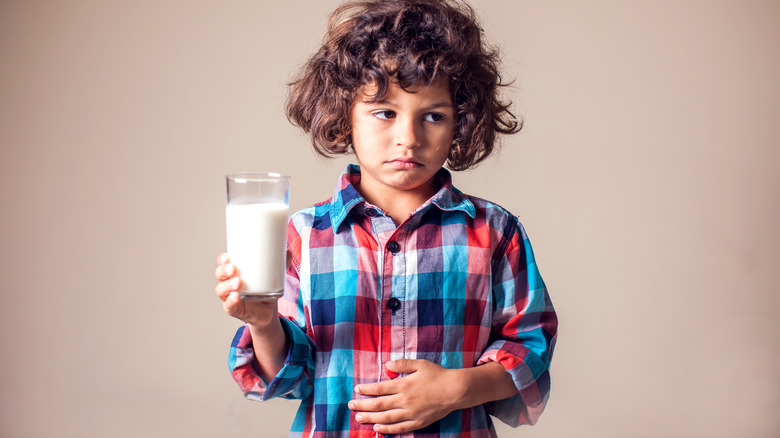Digestion Issues That Are Common In Kids
When you hear a child say, "My tummy hurts," it's not always clear what the issue may be. Are they hungry for a snack, or could a stomach bug be circulating around the classroom? Contemporary Pediatrics reports that as many as 15% of kids experience what's known as chronic functional abdominal pain — ongoing stomach pain that doesn't respond to standard treatment measures (via Boston Children's Hospital). However, not all functional abdominal pain points to a serious medical condition. There are various digestive issues commonly observed amongst children that come with symptoms that can be effectively managed.
Among the top digestive issues seen in kids is gastroesophageal reflux disease (GERD), which affects nearly 10% of infants by the time they turn 1-year-old, according to HealthGrades. Characterized by irritation of the esophagus due to a backflow of stomach acid, Smart Clinic Urgent Care says that children with GERD may also exhibit burping, hiccuping, gagging, or eating difficulties. HealthGrades suggests making a few modifications to eating habits to help alleviate symptoms. For example, keep the child sitting upright for 30 minutes following eating, as car seats or other devices that offer partially reclined support can worsen GERD symptoms.
Constipation and lactose intolerance in children
Pediatricians also report constipation to be a common digestion issue that children face (via Smart Clinic Urgent Care). Whether from certain food items, medications, or changes in their day-to-day routine, large or hard stool can make bowel movements painful for children. Banner Health says that staying sufficiently hydrated, eating a fiber-rich diet, and taking a stool softener can make trips to the bathroom more comfortable.
Alternatively, many children are lactose intolerant (via HealthGrades). Unable to break down the natural sugar found in milk-based dairy products, children may experience diarrhea, gas, abdominal cramping, or bloating. Some individuals are better able to process lactose later in life. In the event that a child exhibits symptoms of lactose intolerance, caregivers may want to refrain from feeding them dairy products for the time being to see if symptoms improve over time. It's possible that the condition may resolve itself as the child ages.
IBD, celiac disease and eosinophilic esophagitis
Children are particularly susceptible to irritable bowel disease (IBD), reports HealthGrades. Caused by inflammation of the digestive tract, children with IBD often experience ongoing stomach pain accompanied by diarrhea (per Smart Clinic Urgent Care). While certain medications can help relieve the discomfort, maintaining a healthy diet can also improve symptoms. Such healthy food items include bananas, eggs, or whole-wheat pasta, while nuts or seeds can exacerbate IBD symptoms.
Lastly, celiac disease and eosinophilic esophagitis are also two common digestive conditions seen in young kids (per HealthGrades). Each of these conditions is related to diet. Characterized by inflammation of the esophagus, eosinophilic esophagitis is usually the result of a food allergy. Therefore, children will want to avoid any known allergens. For children with celiac disease, symptoms are triggered by gluten, which causes the body to attack the small intestine. Therefore, it's important to consult with a pediatrician. Treatment for the condition involves sticking to a gluten-free diet.
Treatment and symptom management for kids
Although recurrent stomach pain in young children can be related to a health condition in some cases, experts reiterate that certain lifestyle choices can be helpful in managing symptoms. "You can manage many digestive issues with a well-balanced diet that includes plenty of fruits and vegetables, appropriate portion sizes and exercise," pediatric gastroenterologist Dr. Swati Kolpuru told Banner Health.
In the event that a child's stomach pain is accompanied by additional symptoms, such as weight loss, difficulty gaining weight, choking while eating, bloody stool, jaundice, persistent diarrhea, or pain that does not improve, consult with a physician for proper diagnosis and treatment of any underlying health conditions. Although the idea of your child being diagnosed with a digestive disease is a scary thought, early intervention can make all the difference. "Many digestive diseases in children can improve or resolve when they are diagnosed early and managed properly," Dr. Kolpuru tells Banner Health.




